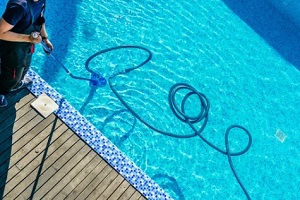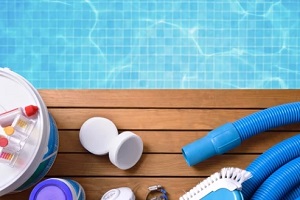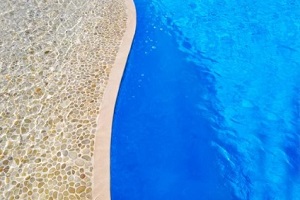 Private pools built on a homeowner’s property offer the benefits of public pools with increased convenience and customization, and no crowds. Homeowners can freely enjoy their backyard oasis, cooling themselves in the summer heat or enjoying impact-free exercise while avoiding the worries about other swimmers, pool hours, and more.
Private pools built on a homeowner’s property offer the benefits of public pools with increased convenience and customization, and no crowds. Homeowners can freely enjoy their backyard oasis, cooling themselves in the summer heat or enjoying impact-free exercise while avoiding the worries about other swimmers, pool hours, and more.
Many people find these advantages are well worth the cost to install and the upkeep. Taking care of a pool the right way is the difference between an installation that wears down quickly and one that lasts for years to come in beautiful condition.
In order to maximize the fun and longevity that a pool can produce, homeowners should familiarize themselves with the different maintenance needs of their pool. For some homeowners, hiring an experienced professional to perform certain maintenance procedures as necessary is a value added convenience.
Here are some of the most important elements of pool maintenance in Delaware that homeowners can do on their own, as well as the tasks that should be left to the experts.
The Importance of Water Chemistry and Filtration
Stabilizing the internal chemistry of a pool can seem complicated, but it is one of the most important continual elements of maintaining a pool. In order to keep their pool from nurturing unwanted colonies of bacteria and algae, homeowners should use pool sanitizer designed to keep the water clean and fresh.
Chlorine is the most popular pool sanitizer because it is simple to use, affordable, and effective. Be aware that there is an important distinction between stabilized and unstabilized chlorine—the latter will burn off in the sun and require more regular replenishing.
 Bromine, the second most common sanitizer, will need to be replenished less than even stabilized chlorine, as it breaks down at a slower rate. Whichever sanitizer is used, it will only work when balanced with the pool’s pH level, alkalinity, and water hardness.
Bromine, the second most common sanitizer, will need to be replenished less than even stabilized chlorine, as it breaks down at a slower rate. Whichever sanitizer is used, it will only work when balanced with the pool’s pH level, alkalinity, and water hardness.
The pH level of a substance is measured on a scale from 1 to 14, with anything below seven being acidic, and anything above seven being basic. Homeowners should not aim to achieve a pH level of seven exactly, and instead aim for a slightly basic level of 7.4 or 7.6. This level provides the best foundation for chlorine to clean the pool.
Homeowners should keep chemicals to decrease and increase pH at hand to stabilize the water as needed. At a minimum, remember to check the pool weekly so that any issues with pH balance can be addressed before problems arise. The pool’s alkalinity will contribute to the rate the pH level changes, so a chemical increaser or even household baking soda may be necessary.
Daily Cleaning and Pool Skimming
The cleanliness of the pool does not entirely rely on its chemical composition. One of the most important tasks that pool owners must regularly complete to prevent corrosion and unwanted growth is physically cleaning the pool.
Depending on where the pool is located, many types of natural pollutants such as leaves, bugs, and sticks are likely to fall into the water. If left alone, they can serve as breeding grounds for bacteria or stain the pool liner; they may even cause scratches and holes in the pool’s interior.
Using a net skimmer, pool brush, pool vacuum, and other similar tools, carefully remove debris and detritus. These tools should be used weekly at a minimum to keep the water clear and the walls clean. For a timesaving alternative, automatic pool cleaners can do much of the work for you.
Opening and Closing the Pool
As a pool owner, you are perfectly capable of doing the majority of pool cleaning and maintenance on your own. However, there are certain aspects where outside help may be necessary. When the pool is about to enter a prolonged period without use, it is wise to close the pool for the season to protect it from the elements.
 Closing the pool and opening it again is a very involved process that is best left to the professionals—otherwise, the important elements such as wiring or piping that keep the pool functional could be damaged.
Closing the pool and opening it again is a very involved process that is best left to the professionals—otherwise, the important elements such as wiring or piping that keep the pool functional could be damaged.
Covering a pool for the winter will necessitate lowering the water level, complete cleaning, and the application of special winterized chemicals to inhibit algae growth.
Reach Out to Delaware’s Pool Maintenance Professionals
The amount of work and the depth of knowledge required to service and maintain a private pool may seem intimidating. However, daily or weekly cleaning and chemical balancing are tasks that both new and veteran pool owners alike can quickly master, providing you with control over your outdoor oasis. For more complex tasks such as annual pool opening and closing as the seasons change, be sure to work alongside the experts.
The professionals at Masten Pools can help you properly close your Delaware pool for the winter and open it again in spring so that it does not become damaged. Contact us to schedule an appointment for opening or closing, or to discuss pool renovations or installations that you are considering.
